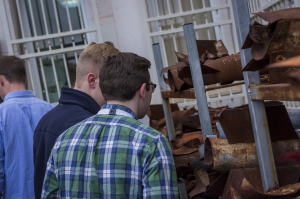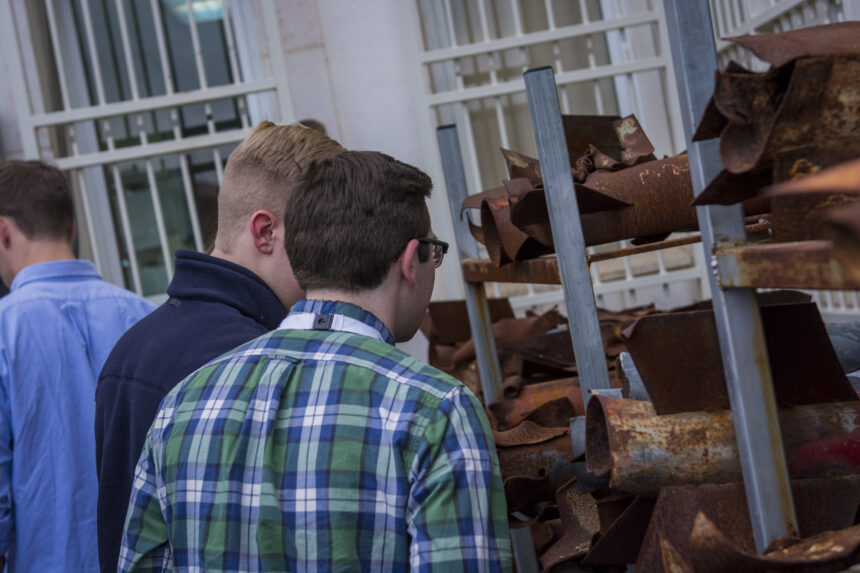
Anders Kiledal | Collegian
Sophomore Michael Lucchese examines exploded Qassam rockets from Gaza at a police station in the “bomb shelter capital of the world,” Sderot, Israel.
As Russia becomes the major player in Syria and ISIS gives countries with diverging interests a common enemy, America has the opportunity to take back the lost initiative in Iraq after the weary slog of wars, Colonel Kobi Marom believes.
Marom, retired from the Israel Defense Forces after 25 years of service and now a research associate for the International Institute for Counter-Terrorism, answered a few questions during lunch after showing Hillsdale students the Golan Heights and Israel’s borders with Syria and Lebanon. He acknowledged gaps between American and Israeli foreign policy but pointed out a number of opportunities for continued cooperation as the Middle East continues to be redrawn.
“I hope that the attacks in Paris and California will be a wake-up call to have a clear strategy about what are we going to do with the threat from ISIS and cooperate together with the Russians. We can give up to the Russians here in Syria and have them fighting with us against the real threat, which is ISIS.”
While Israel disagrees with American diplomacy with Iran, Marom said Israel and America share the more immediate threat of ISIS in what was Iraq. Syria has conceded to Russian influence, and America needs to mitigate that reality, Marom argued. The country needs to ask itself how much effort it is willing to expend for its interests in the region.
“I think the Russians use the situation that we have of a clear decline of the American influence all over the Middle East,” Marom said. “And in my point of view, it’s not that they just want to stay with their influence in Syria, they also want to put a lot of pressure on the international community to have a comprehensive deal about Syria and the crisis in Ukraine as well.”
In addition to America and Russia, the other major players in the Middle East today are Iran, Saudi Arabia, and Turkey. Marom explained that Turkish president Recep Edergan must deal both with his country’s Syrian refugee population and its conflict with the Kurds.
“The Turks are playing a double standard,” Marom said. “They are part of NATO, they are supposed to fight, but on the other hand they don’t want to cooperate with the Kurds who are enemies to them, so if I’m looking forward, we are going to see a new Middle East with an independent Kurdish country — not on the Turkish territory but on the Iraqi side. That’ll be a compromise, but we are going to see a new country for the Kurds, there is no question.”
Marom said that, as a rich and powerful Sunni country, Saudi Arabia leads the Sunni world and wants to continue to keep a trans-Sunni axis. That brings them in conflict with Iranian interests in Iraq and Syria.
“They’ll try to cooperate with the Sunni countries against the Iranian regime. Egypt, Saudi, Jordan, Turkey — and maybe Israel as well, if we will have any advance on the Palestinian trail.”
Marom said the Iran nuclear deal represents the clearest point of departure between American and Israeli strategy in the region. He drew parallels between Israel’s concerns about a future nuclear Iran and news that North Korea had likely performed another nuclear test.
“Israel said something very clear, if they are talking about a peaceful project why do they still have secret sites? Why do they need ballistic missiles? Why did the international community allow them to keep all those facilities for the enriching process, as well? So our major concern is that within five or ten years they will reach the bomb.”

